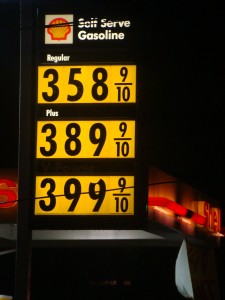 Everyday on the ride to school, I have made it a habit to glance at how much gasoline costs that day. If you partake in a similar ritual, you might have noticed a pattern that I have, which is, when the Middle East is in the headlines, the prices go up – and when the region is “calm,” those prices drop like a rock.
Everyday on the ride to school, I have made it a habit to glance at how much gasoline costs that day. If you partake in a similar ritual, you might have noticed a pattern that I have, which is, when the Middle East is in the headlines, the prices go up – and when the region is “calm,” those prices drop like a rock.
Just recently, this theory proved true, with prices seemingly taking a sojourn from the roller-coaster it had been riding on after the BP oil spill disaster. However, those prices returned to the ride, rising as tensions in the Middle East were escalating into political turmoil and upheaval.
For years, gas companies have claimed that these prices change in correlation to current events. Currently, gas companies are stating that the situation in Libya is causing gas prices to rise. However, is this a legitimate claim, or are these companies doing what they do best: maximizing profits?
According to Michelle Burdette and John Zyren of the U.S. Energy Information Administration (EIA), the price per gallon you were paying for gas yesterday is proportional to the price the refineries paid for crude oil two-and-a-half months ago. That would mean that the gasoline you just purchased was bought by the refineries in mid-January, the point at which headlines were beginning to shed light on the turmoil in the Middle East.
If the claims that the gas companies are making about the correlation between prices and the situation in Libya are true, one could conjure that they might have made a similar case during the upheaval of the Egyptian government. Well, that person would be correct.
Companies claimed that the unrest occurring in the Middle East was going to cause an exponential rise in prices. The American population weighed this claim, kept buying gas, and the prices seemed to rise overnight.
However, if the model that the EIA created is legitimate, then it would not be possible for prices to rise only days after a major world event. More importantly however, this answers our question in that these companies are simply maximizing a profit; and members of the AHS community are quite livid about this.
“Gas prices are outrageous right now! Hopefully prices will go down,” sophomore Brody El-Achi said. However, rising prices are not serving as a catalyst solely for anger, but for changing daily patterns.
“I definitely try to carpool with friends now, because I’ve paid $80 to fill up a tank of gasoline,” senior Victoria Ko said.
For some students, rising prices are beginning to make them reconsider driving. “It’s [bad], because it’s more expensive, and you’re more considerate of how much you drive, because you don’t want to waste gas,” junior Evelyn Jaramillo said.
Why don’t the gas companies simply convey the truth, and state that the prices are a culmination of events that occurred months ago?
One could venture to argue that it would be because if this was so, prices would be lower, therefore generating a lower profit for these companies. When all is said and done, for these corporations, it is the fiscal, not the social ramifications of the areas they are involved with that are important to them – and in the end, it only hurts the consumer, as many have felt while pumping gas recently.






Colleen • Mar 30, 2011 at 10:47 am
That’s so cool Noah, I’ll be sure to tell my parents that next time they buy gas!